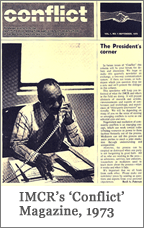![]()
Overview:
IMCR, the Institute for Mediation and Conflict Resolution, is one of the pioneers in the field of community dispute resolution. From it's earliest beginnings IMCR was at the forefront of developing programs that sought to help communities find alternative methods for managing and resolving a wide range of conflicts, from interpersonal disputes to those involving the judicial system. When New York drafted and passed the New York State Community Dispute Resolution Bill they relied on IMCR's for its expertise and technical assistance. Now there are Community Mediation Programs in each of the 62 counties of the State of New York. IMCR's influence is not just local. Through the creation of unique and powerful training programs that have assisted communities and government agencies across the country and now the world, IMCR is one of the leading organizations in the field of community dispute resolution. Even while the organization continues to evolve it's goal has remained consistent: to promote non-violent principles while empowering individuals to respond constructively to conflict.
From it's earliest beginnings IMCR was at the forefront of developing programs that sought to help communities find alternative methods for managing and resolving a wide range of conflicts, from interpersonal disputes to those involving the judicial system. When New York drafted and passed the New York State Community Dispute Resolution Bill they relied on IMCR's for its expertise and technical assistance. Now there are Community Mediation Programs in each of the 62 counties of the State of New York. IMCR's influence is not just local. Through the creation of unique and powerful training programs that have assisted communities and government agencies across the country and now the world, IMCR is one of the leading organizations in the field of community dispute resolution. Even while the organization continues to evolve it's goal has remained consistent: to promote non-violent principles while empowering individuals to respond constructively to conflict.
Early History:
In 1969 the Ford Foundation provided up to five million dollars in seed monies (known as demonstration grants) to organizations that were focusing on judicial reform and community dispute resolution. Part of those funds (1.1 million dollars) went to Theodore W. Kheel, one of the leading lawyers in the nation involved in labor mediation and arbitration, who worked at that time for the American Foundation for Automation and Employment.
 The concept was to see if practices like negotiation, mediation and arbitration that were used to manage labor-management disputes could be applied to resolving community conflict and interpersonal disputes. In the beginning Kheel and his team occupied two floors at the Automation House at 49 East 68th Street, a building that had been the site of the former Russian Consulate. There was enough space at the Automation House to accommodate offices, conference rooms, special training classrooms and even a library.
The concept was to see if practices like negotiation, mediation and arbitration that were used to manage labor-management disputes could be applied to resolving community conflict and interpersonal disputes. In the beginning Kheel and his team occupied two floors at the Automation House at 49 East 68th Street, a building that had been the site of the former Russian Consulate. There was enough space at the Automation House to accommodate offices, conference rooms, special training classrooms and even a library.
On August 9, 1972, the organization was incorporated with a Board of Directors that included the Honorable Basil Paterson, George Nicolau, Lewis B. Kaden, Theodore W. Kheel and Arthur Barnes.
At the same time, The Ford Foundation continued to explore the benefits of providing mediation and community resolution services to urban America. Pursuant to that goal they funded the Board of Mediation for Community Disputes in New York City. This agency supplied mediators for disputes involving either landlords and tenants, merchants and consumers, or students and universities. In another grant the Ford Foundation provided funding for the Center for Mediation and Conflict Resolution, an agency that specialized in training ADR (Alternative Dispute Resolution) facilitators. It was the merger of these two organizations that created IMCR as we know it.
